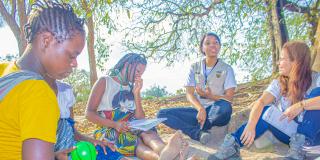
Nelma and Carmirene and are two volunteers working on VSO's Empowering Adolescent Girls to Learn and Earn (EAGLE) project in Mozambique. This project uses innovative education technology tools to reach 4,200 out-of-school girls, improving their literacy, numeracy, business, and life skills.
For Nelma and Carmirene, education is not just about school, it is about meeting people where they are, using the right tools, and challenging harmful norms. Here are their stories.
Breaking down barriers to reproductive health rights
Meet Nelma
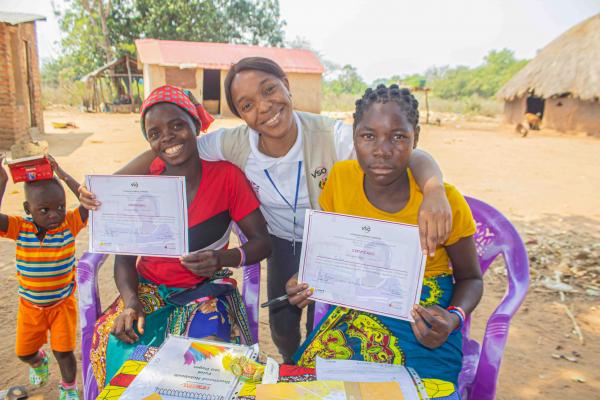
When Nelma Joaquim joined VSO in 2022, she was stationed in the district of Sussundenga, an Administrative Post of Dombe. From the beginning, she faced a cultural challenge—many people in the community believed that education was not meant for women and girls.
"When I saw the volunteer opportunity with VSO, I knew it was the right fit for me. I had always wanted to work closely with communities, and this project gave me the chance to continue making an impact. I discovered the position through Facebook, where I first learnt about VSO and its mission. I immediately applied because I saw it as another opportunity to engage with and support my community in a meaningful way."
"Before joining VSO, I worked extensively on community development projects, collaborating with the territorial government on education and other initiatives. My academic background includes a degree in Animal Production Engineering and a postgraduate qualification in Teaching Methodology. I have also worked as a teacher, which gave me direct experience working with communities."
Traditionally, women in Sussundenga are expected to stay at home, take care of the family, and raise children, while men pursued education and work opportunities. When Nelma and other female teachers arrived in the district, the community was sceptical at first but gradually began to see that women could also be educators and leaders.
Another significant challenge involved deep-rooted taboos and myths. When she first met the girls, she noticed they held misconceptions about education, gender roles, and technology. For example, they were told that women should not own or use cell phones or tablets, as these were considered exclusive to men and husbands.
Overcoming these barriers required community sensitisation and engagement, helping families understand that technology could be a valuable tool for learning and empowerment. Through continuous dialogue and education, these misconceptions started to shift, and the girls began embracing the opportunities provided by the project.
Another deeply ingrained belief among the girls was that family planning was not meant for women. They were told from a young age that if they used family planning methods, they would never be able to have children again. Because of this, many girls were afraid to access reproductive health services.
Through education and open discussions, Nelma and the team helped them understand their rights to make informed decisions about their bodies. They learnt that they could choose when to have children, how many to have, and how to take control of their reproductive health. This was a breakthrough, as the information was well received by the girls, helping them feel empowered and in control of their future.
Economic empowerment and breaking gender norms
Meet Carmirene
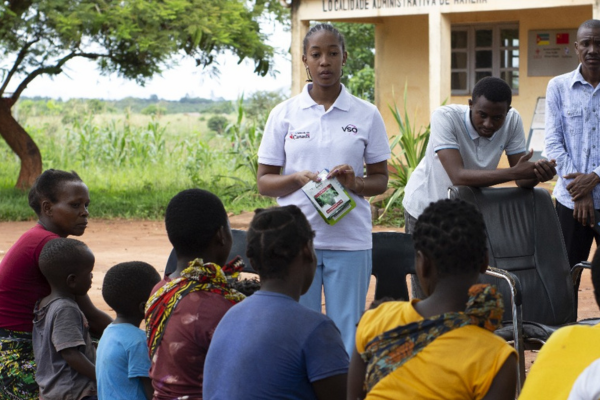
Carmirene initially joined VSO with the goal of becoming a community volunteer teacher. However, after her application was reviewed, she was encouraged to apply for the national volunteer role, recognising her potential to create broader impact beyond classroom teaching.
Excited by this opportunity, she embraced her new role and committed to empowering young girls through education, literacy, and economic independence.
She says, "I was drawn to the EAGLE project because I recognised the urgent need to support young girls and adolescent girls in education, literacy, numeracy, and livelihood opportunities."
When she first started working with the girls, she observed that while they had some level of knowledge, they lacked the confidence and encouragement to apply it effectively. Her role became one of facilitation and motivation, ensuring they had the support needed to unlock their potential.
One of the most transformative moments was introducing digital learning through tablets. Many of the girls had never seen or used a tablet before, and their excitement was overwhelming when they learnt they would have access to them for nine to ten months. Seeing the enthusiasm and determination in their eyes as they explored new ways of learning was a rewarding experience for Carmirene.
When I joined in September 2022, I realised this role was different from what I had done before, but it excited me because it gave me the chance to make a real difference in young girls' lives. Many of them had never had access to formal education, and I saw how motivated they were to learn."
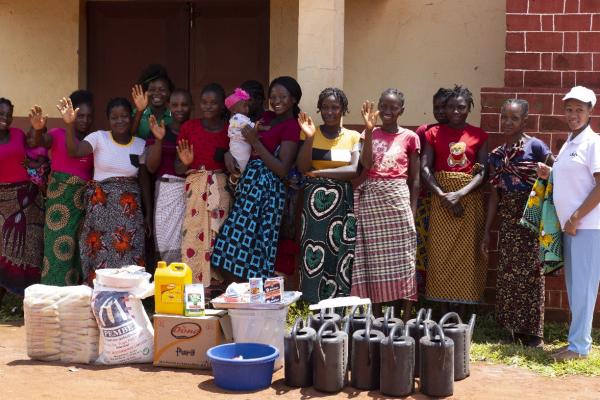
Beyond education, one of the most impactful changes was in economic empowerment. The girls believed that only men were allowed to handle money or run small businesses. They had grown up in a society where financial independence was reserved for men, and women were not encouraged to engage in business or savings.
Through the project, they learnt that women, too, could run businesses, manage money, and be financially independent. This realisation led them to form savings groups, where they could learn how to save, invest, and start small businesses. Before this intervention, there were no savings groups in the community. By removing the negative mindset that women could not be financially independent, the project helped these girls take control of their economic futures.
Carmirene shares, "I wanted to be part of this initiative because I knew that teaching girls how to read and write would empower them to be economically independent. There is a clear gap between girls living in towns and those in rural areas, especially in terms of opportunities and access to education. I could help bridge that gap and create better opportunities for these girls."
"Through VSO, I not only shared my own experience but also learnt new approaches to community work, mentorship, and education delivery. Working with a diverse team exposed me to different perspectives and methods, making my experience even more enriching."
Transforming the lives of disabled young girls
Both Nelma and Carmirene have witnessed first-hand the transformative power of education and empowerment in the communities they serve.
One story that stands out is that of Anna, a young girl who lives with a disability. Growing up, Anna felt rejected by her community and believed she could not contribute or achieve anything because of her condition. She was shy and hesitant when she first joined the project, fearing further rejection.
However, once she saw that the EAGLE project was inclusive of people with disabilities and emphasised equal rights for all, she became more engaged and confident. Through the project, she learnt to read, write, and use digital tools, which opened doors for her to pursue business opportunities.
The most profound change for Anna was realising that her disability was not a barrier to education, work, or personal aspirations. She now feels valued in her community, actively participates in discussions, and has even started using social media platforms like Facebook and TikTok to connect with others and learn new skills.
Breaking taboos and shifting mindsets
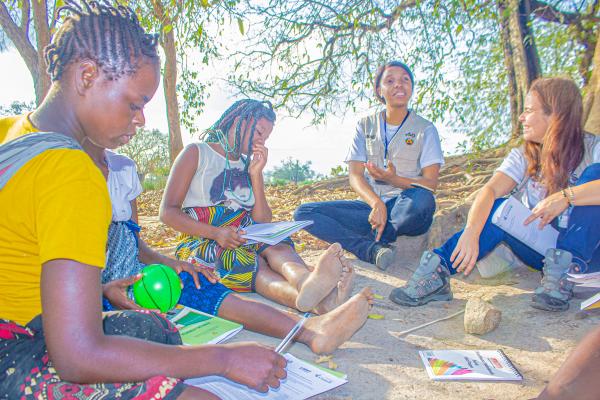
Through their work, Nelma and Carmirene helped break cultural taboos that had long restricted young girls' access to education, technology, and financial independence.
Many of the girls had been told since childhood that family planning was not meant for women and that using contraceptives would make them infertile forever. Because of this, they were afraid to seek reproductive health services.
Through education and awareness sessions, the girls learnt that they had the right to make informed decisions about their bodies. They now understand that family planning allows them to choose when to have children, how many they want, and how to manage their reproductive health. This knowledge has empowered them to take control of their futures and reject the harmful myths that had held them back for so long.
Similarly, many of the girls grew up believing that only men could run businesses or handle money. Through the project, they learnt that women, too, could be financially independent, start businesses, and manage their own savings.
This led to the formation of savings groups, where the girls now save money, invest in small businesses, and support each other financially. Before this intervention, there were no savings groups in the community, and the idea of women handling money was almost unheard of.
Personal and professional growth: lessons from the field
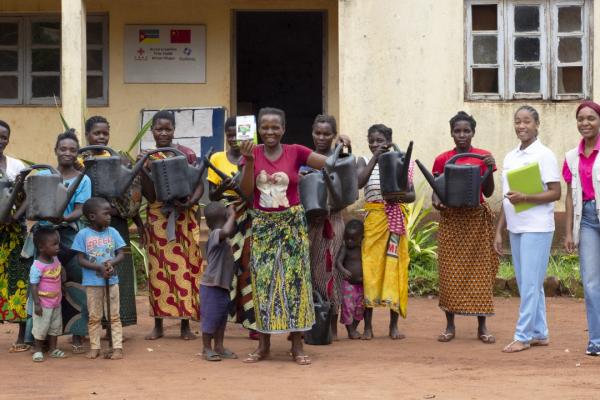
For Nelma, working on this project has been a deeply personal and transformative experience. She feels that she has become more human and compassionate, realising the impact education and empowerment can have on changing lives.
She says, "If I had not joined VSO, I would probably be working in a more traditional role, either as a teacher or in the animal production field. However, working directly with communities, listening to their stories, and witnessing change has given me a greater sense of purpose."
She now feels that her mission is accomplished, even as the project nears its end. If given the opportunity, she would continue working in similar projects, as she has found her passion in community empowerment.
For Carmirene, while she is proud of what has been achieved, she acknowledges that there is still more work to be done. She feels deeply committed to supporting more girls, as there are many who still need help.
She shares, "If given the chance, I would continue working on projects that bridge the gap between urban and rural girls, ensuring that those in marginalised communities get the same opportunities as those in cities.
I am grateful for the opportunity to work with VSO and witness first-hand the positive changes taking place in the lives of young girls."
What makes VSO unique?
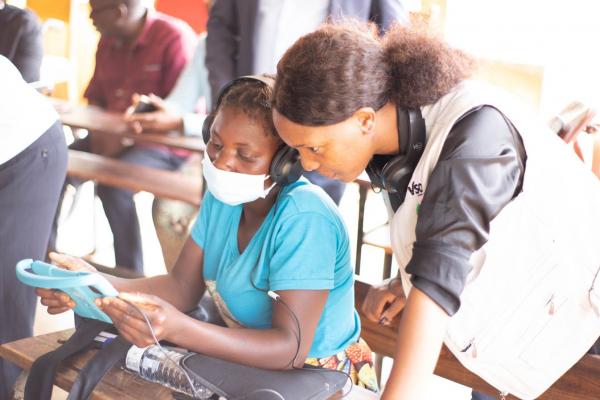
Both Nelma and Carmirene believe that what sets VSO apart from other organisations is its unique approach to community engagement and sustainable impact.
One major factor is technology integration, particularly the use of tablets for digital learning. Many girls had never used a tablet before, and within ten months, they learnt to read, write, and count—something that formal schools had not been able to achieve.
This rapid progress and impact led to government partners requesting an extension of the project, as they recognised the significant contribution it had made to improving literacy and education in their communities.
For Nelma and Carmirene, this project has shown that education is not just about schools—it is about meeting people where they are, using the right tools, and challenging harmful norms.
They hope that more organisations and partners will recognise the importance of such initiatives and invest in scaling up these efforts so that more girls can benefit from life-changing opportunities.
Empowering Adolescent Girls to Learn and Earn (EAGLE)
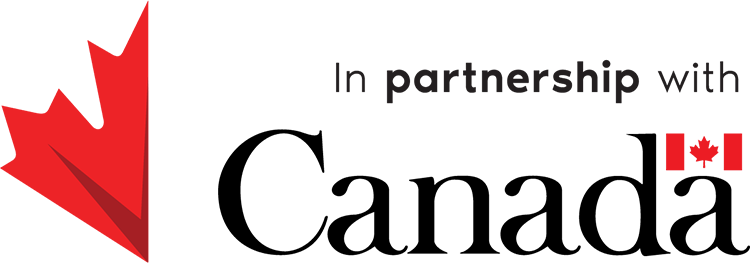
More than 60% of Mozambicans live below the poverty line, so for them marrying off their daughters can relieve the family of the burden of feeding another child. Food security is a big issue here.
Funded by Global Affairs Canada, the Empowering Adolescent Girls to Learn and Earn (EAGLE) project aims to reach 4,200 out-of-school girls, improving their literacy, numeracy, business, and life skills.
Read more

The two volunteers empowering girls and young women in Mozambique
Nelma and Carmirene and are two volunteers working on VSO's EAGLE project in Mozambique. For Nelma and Carmirene, education is not just about school, it is about meeting people where they are and using the right tools to challenging harmful norms. Here are their stories.
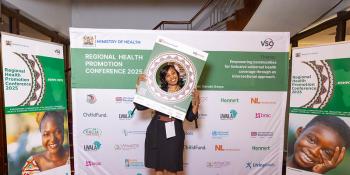
In photos: Our Regional Health Promotion Conference 2025
Check out some of our favourite photos from Regional Health Promotion Conference (RHPC25). This event sought to reimagine Universal Health Coverage through the lens of intersectionality.
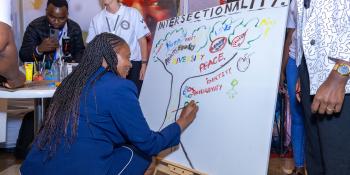
Using intersectionality to create healthy beginnings and hopeful futures
World Health Day brings global attention to the urgent need to end preventable maternal and newborn deaths. Learn more about how our Regional Health Promotion Conference is tackling these issues head on.
